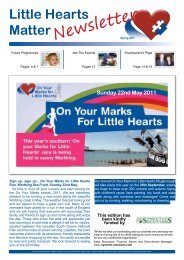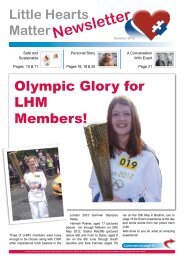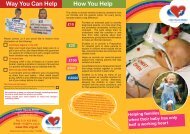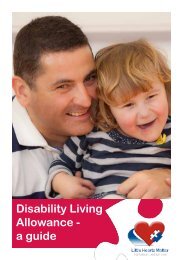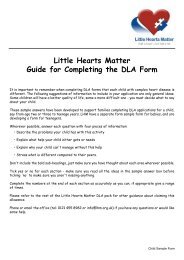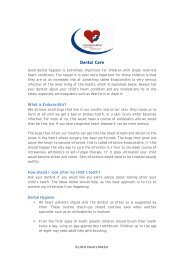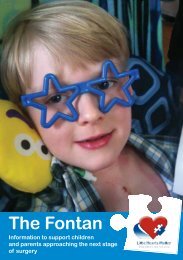here - Little Hearts Matter
here - Little Hearts Matter
here - Little Hearts Matter
- No tags were found...
Create successful ePaper yourself
Turn your PDF publications into a flip-book with our unique Google optimized e-Paper software.
2122 LHEARTS 20PP:NewsletterNo2 2009.qxd 05/11/2009 10:06 Page 10Spotlight On...In every issue we will feature articles w<strong>here</strong> we will talkabout different aspects of education and cover ideas aboutpossible sources of financial support to help you.EducationDeveloping a Healthcare PlanEducation is so vital to all children, and everyparent will want to ensure that their child’s heartcondition does not become a barrier to themaccessing a good education in order to movetowards an independent fulfilled life as an adult.In this first article, we are focusing on how todevelop a healthcare plan. Every child with asingle ventricle heart condition should have ahealthcare plan in place in school. Somechildren need support with their education,however many manage very well in mainstreamschools with some thoughtful adjustments to suittheir needs. We will cover other aspects ofeducation in future newsletters, such as how toaccess additional support if your child needs it.A healthcare plan is a way of making sure thatmedical information about your child is availablein an easily accessible and understandableformat. It is a document held in school identifyingthe level of support your child needs throughoutthe day, signs and symptoms to look out for andwhat to do in an emergency. It should be writtenin non-medical language which can beWritten byIsabel Baumberunderstood by a range of school staff. Thehealthcare plan should be used as a tool to helpeveryone to understand your child’s needs.When developing the plan, it can be a goodidea to go through a typical school day and writedown every aspect of care which your childneeds which is different to their peers in any way.This section needs to include all the commonchallenges for the children within their day atschool: ability to exercise, need for energy-filledsnacks, coping in cold weather, concentrationlevels, homework, etc. The plan should alsoinclude information on your child’s diagnosis,treatment plans, medication (and effects) plusany specific limitations your child may have. Theplan should also set out the best course of actionin the case of an emergency, for example:-• if a child on anti-coagulation therapy should fall;• if they become uncontrollably breathless;• if they complain of chest pain.What action should the school take?Who should the school call?It can be really helpful to have a laminatedinformation card with a plan of the actionsneeded if a child falls ill in school. Whendisplayed on the school office wall, the PEPlease don’t hesitate to contact the LHM office if youhave any queries about any aspect of education.We currently have booklets published on ‘EarlyYears and Infant School’ and ‘Junior School’, whichare available free of charge to members. Furtherpublications about education are currently beingwritten. We also have a Benefits Booklet, whichcovers a whole range of ideas.We’d also be really pleased to hear about any otherideas members have.department, the staff room and in any relevantclassroom it allows school staff easy access tothe emergency information. It is also useful tohave the child’s medical information available totake to hospital in the case of an emergency.If other health or social teams are involvedwith a child’s care it is important that they areable to add to any health plans or educationplans. For example a physiotherapist may haveexercises that could be incorporated into a PElesson. Or a psychologist may advise that asupportive approach to hospital should beintroduced into the classroom.People who can help with writing your child’shealthcare plan are the health visitor (for under5s), the school nurse, your community nurse (ifyou have one) and your Cardiac Liaison Nurse.Once the healthcare plan is written, the healthvisitor or school nurse should then talk it throughwith the school staff, and provide any trainingnecessary, such as administering medications.<strong>Little</strong> <strong>Hearts</strong> <strong>Matter</strong> can provide you withsample healthcare plans used by other parents -you will of course need to remember that everychild is different, but some of the formats andideas used by other families may be helpful.10BenefitsHelp with Hospital CostsIn this article we thought we would focus oncosts associated with a stay in hospital. Whenyour child is in hospital, t<strong>here</strong> can be many extraexpenses involved, such as car parking, notbeing able to cook your own meals,accommodation, travel, and of course for somepeople t<strong>here</strong> may be a loss of earnings whilethey care for their child.If you are finding it hard to cover these costs,the first person to talk to should be your CardiacLiaison Nurse or the hospital’s social worker,who should advise you about any hospitalspecific sources of funding. They will knowwhether t<strong>here</strong> is currently money available andwhat the criteria are for applying. This issometimes referred to as an emergency fund,and may be held by a local charity. Otherhospitals may have money specifically to helpwith parking.If your family is on a low income, and youknow in advance about your child’s hospital stay,you could approach either the Social Fund or theFamily Fund.The Social Fund gives various types ofpayments designed to help people on a lowincome with specific costs. The purpose of thefund is “to ease exceptional pressures onfamilies”. Community Care Grants may beapplicable for families with disabled children e.g.costs of hospital visiting. Further information isavailable by visiting www.dwp.gov.uk then type‘guide to social fund’ into the search box or youcan contact your local Jobcentre Plus.The Family Fund gives grants to low-incomefamilies to meet the additional needs of caring fora severely disabled child. The value of the grantdepends on the items requested, familycircumstances and the funding available. T<strong>here</strong>is no entitlement to a grant from the Family Fund.Hospital visiting costs have been funded.Eligibility includes income related points (grossincome less than £23,000 or £25,000 in Walesand savings of £18,000 or less). Furtherinformation is available by telephone 0845 13045 42 or from www.familyfund.org.ukFamilies on income-related benefits should bein contact with the hospital benefit office to findout about help with travel costs to and fromhospital appointments.If you live in Scotland, you could tryapproaching Chest, Heart and Stroke Scotland,a charity which offers welfare grants e.g. forholidays, hospital visiting, heating, white goods.You will need a sponsor (e.g. health visitor) toapply on your behalf. Further information isavailable from www.chss.org.uk or telephone0131 225 6963.If your family has private medical insurancewhich includes cover for your child (this isn’talways possible, as many insurers will not coverpre-existing medical conditions), you can applyfor a payment for each day that your child isbeing treated in an NHS hospital rather thanbeing treated as a private patient.



